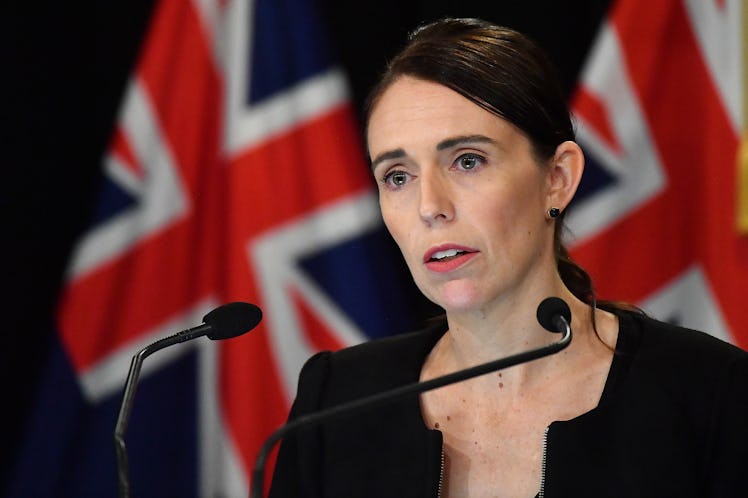
Jacinda Ardern's Refusal To Say The Alleged New Zealand Shooter's Name Is Deeply Important
As the alleged suspect in a deadly mass shooting in New Zealand continues to make headlines, there is at least one person who will be turning her attention elsewhere. New Zealand Prime Minister Jacinda Ardern said on Tuesday, March 19 that she would deny the alleged gunman the publicity he was apparently seeking by refusing to say his name. Obviously, Jacinda Arden's refusal to say the New Zealand shooter's name is so important for so many reasons.
According to The Guardian, the comments came in Ardern's first address since the March 15 shootings that occurred at two mosques in Christchurch, New Zealand, which killed 50 people and left another nine in critical condition. “He sought many things from his act of terror, but one was notoriety. That is why you will never hear me mention his name,” she reportedly said of the alleged shooter. “He is a terrorist. He is a criminal. He is an extremist. But he will, when I speak, be nameless."
Ardern then urged the public not to give the gunman the publicity he seemed to so desperately crave, adding:
And to others, I implore you: speak the names of those who were lost rather than the name of the man who took them. He may have sought notoriety but we, in New Zealand, will give nothing – not even his name.
With that, Ardern appears to be copying an increasingly popular policy of denying mass shooters the attention and infamy they seemingly want. Many alleged shooters have reportedly expressed a desire for fame, glory, and notoriety for their crimes, and will sometimes play to publicity with manifestos or videos detailing their supposed motives. And the attention can be genuinely harmful — according to a 2015 study by University of Arizona researchers and published in scholarly journal PLOS ONE, a mass shooting increases the likelihood of another one in the 13 days after the attack. Additionally, the study suggests that media coverage of the shootings may be to blame for copycat events.
"What we believe may be happening is national news media attention is like a 'vector' that reaches people who are vulnerable," Sherry Towers, a research professor at Arizona State University and lead author of the study told CNN in 2015. Jack Levin, a criminologist at Northwestern University, added, "It's the excessive media attention that creates the copycat phenomenon. We make celebrities out of monsters."
Given the natural desire to understand why someone might commit a truly violent act — and hopefully prevent future attacks — it's understandable that after an attack or incident of mass violence people might want to know about the alleged attacker. But clearly, it's important to be careful with that. For her part, Ardern appears to be on the path of refusing to bring any further attention to the shooter and choosing to highlight the victims instead. It is, after all, their stories that deserve to be heard, told, and remembered.
Speaking of, here are are some ways you can help victims of the New Zealand shooting, from donations to speaking up in support of the Muslim community. At the end of the day, that's what's really deserving of our attention.